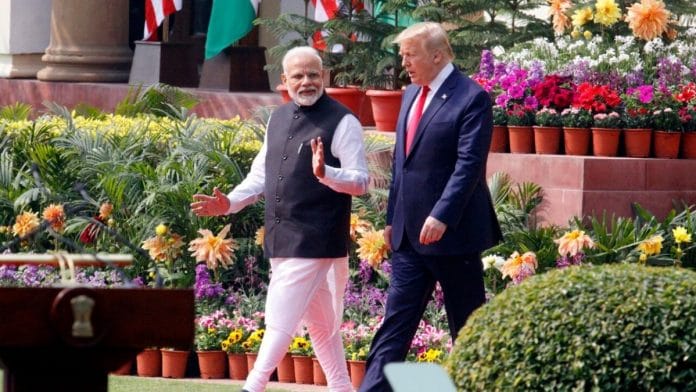In a strongly worded statement, Government of India has condemned and refuted the findings of the US Commission on International Religious Freedom report as “biased and politically motivated, and continuation of persistent attempts to misrepresent isolated incidents and cast aspersions on India’s vibrant multicultural society which reflects USCIRF’s deliberate agenda rather than a genuine concern for religious freedom”.
Though this is not the first time such reports have painted India as a country highly intolerant of its religious minorities, the March 2025 report is the first time a recommendation has been made for India to be designated as “country of particular concern”. It alleges that minorities in India are facing ‘deteriorating treatment’.
Fifteen other countries, including Afghanistan, Russia, China, Pakistan, and Saudi Arabia, have been found to be treating their respective minorities badly.
Three aspects of this report should be of concern to New Delhi, and it should be brought to the attention of those the report is supposedly submitted to.
Weed out anti-India elements
The first is the report’s mention of the assassination of separatist Sikh elements in Canada posing as members of the Sikh religious community and the alleged attempt on the life of another Khalistani separatist.
“The Indian government also continued to expand its repressive tactics to target religious minorities abroad, specifically members of the Sikh community and their advocates… International reporting and intelligence from the Canadian government corroborated allegations linking an official in India’s Research and Analysis Wing (RAW) and six diplomats to the 2023 assassination attempt of an American Sikh activist in New York,” the report has said. It’s important to note that these radical elements do not represent the Sikh community.
While the Government of India has categorically rejected the allegation, the Canadian government and the prosecuting authorities in the then Biden dispensation initiated legal actions against Indian officials. While the earlier dispensations in both countries, Canada and America, have been shown the door, notoriously anti-India elements and outfits are probably yet to be identified and booted out. New Delhi should follow up with the present political establishments in both countries and set the record straight.
The fourth meeting of the national level officials responsible for national security, intelligence gathering and overall supervision of strategic and security aspects of their respective countries, euphemistically called ‘spy chiefs’, was held in New Delhi recently. The chiefs of the Five Eyes countries, comprising Australia, Canada, New Zealand, the United Kingdom, and the US, as well as the Director of the Canadian Security and Intelligence Service (CSIS) Daniel Rogers who till recently served as Deputy National Security and Intelligence Advisor (NSIA) to the Prime Minister, attended the meeting.
The Five Eyes, an Anglosphere intelligence agency, played a significant and notorious role in alleging New Delhi’s hand in the elimination of individuals inimical to India’s security interests through extra-territorial operations, allegedly assisted by the external intelligence agency of India, the Research and Analysis Wing (R&AW). Hopefully, some of the thorny issues were ironed out in this meeting, but more needs to be done.
An act of transgression
The second aspect that should be of serious concern to New Delhi is the reference to R&AW in the USCIRF report. It recommends to “impose targeted sanctions on individuals and entities, such as Vikash Yadav and RAW, for their culpability in severe violations of religious freedom by freezing their assets and/or barring their entry into the US.”
This type of recommendation is a first. It directly amounts to interference in the domestic governance of India, security and intelligence gathering mechanism of the government, and is a violation of globally respected and followed conventions.
For just this one act of transgression, the USCIRF deserves to be labelled as an ‘outfit of particular concern’. Any support, overt or covert and financial assistance to terrorism and terrorist outfits by an organisation is considered part of the terrorist activities and should be liable to be treated as one.
Unsubstantiated claims
The third and more serious aspect is that a non-federal non-governmental institution is gaining salience in the administrative narrative in the US. The White House should distance itself from this report and the organisation and issue a directive that the administration does not accept the report nor upload it on its official portal.
The report’s contention that the enactment of the Citizenship (Amendment) Act (CAA) potentially exposes millions of Muslims to detention, deportation and statelessness when the government completes its planned nationwide National Register of Citizens, is unsubstantiated and an absolute canard. Another blatant lie and direct interference in the internal matters of the country is the highly objectionable statement that, “prior to national elections in June, Bharatiya Janata Party (BJP) members, including Prime Minister Narendra Modi, propagated hateful rhetoric and disinformation against Muslims and other religious minorities to gather political support.”
The report also recommends that the US government should review the sale of arms such as “MQ-9B drones under Section 36 of the Arms Export Control Act”, and goes to the ridiculous extent of saying that “this may contribute to or exacerbate religious freedom violations”. India sealed a deal with the US to procure 31 Predator drones at $4 billion to shore up its defence along the Eastern borders. The White House should clarify if it supports this contention by USCIRF, failing which New Delhi should put this deal on hold.
The USCIRF draws its authority from two Acts, Frank R. Wolf International Religious Freedom Act 2016 and the International Religious Freedom Act of 1998. The best that the Trump administration can do is to withdraw this authorisation and get this monkey off its back.
Seshadri Chari is the former editor of ‘Organiser’. He tweets @seshadrichari. Views are personal.
(Edited by Theres Sudeep)






